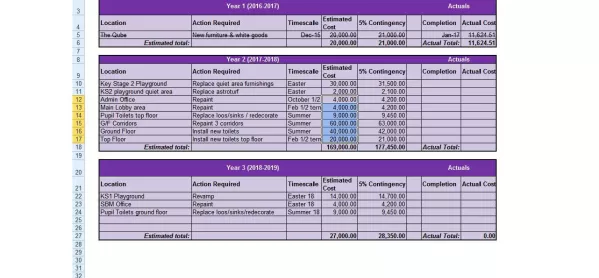We all know that children come to school to learn, and that effective and outstanding practices in teaching are key to ensuring they receive a high-quality education. But what about the environment, and does it have an impact on pupil learning? According to research, it most certainly does. A study conducted by the University of Salford found that the classroom environment can affect a child’s academic progress by as much as 25 per cent in one year. That’s a significant percentage but not particularly surprising when we consider how we, as working adults, feel when we are at work. If you worked in a worn out, cold, uncomfortable room you are likely to be less productive than you would be in a room that is clean, light with heating that works and windows that open. Maslow’s Hierarchy of Needs shows that such a comfortable environment pushes us into the esteem section of his pyramid, so why should children be any different?
Although many people who are unfamiliar with the role of the school business manager (SBM) mistakenly believe that our role is solely of finance, premises improvements and maintenance is one of the many responsibilities that we have. We may not physically do the work, but we are responsible for ensuring the environment is safe, clean and comfortable. Along with the school’s site manager, the SBM must ensure they keep on top of the building maintenance and the best way to do this is through a robust premises maintenance plan which will record and document all aspects of the school premises. It should, ideally, be a plan for the next three years and will ensure that the school has a strategy in place for its maintenance and improvement. Costing the plan, along with a small contingency, will help the SBM to ensure that sufficient funds are set aside when the school is setting its annual budget plan.
Share this task with other senior leaders because it can be an onerous one. I would recommend that two senior management members, along with the site manager, inspect the whole school once a term with the key purpose of identifying maintenance and improvements needs, including repainting, plastering, new flooring etc. It’s worth creating a template prior to the inspection that details updates on classrooms, and having an area to write down what is required. After the inspection, the senior management team should agree the works to be carried out over the three-year period, and the SBM can then input the data into the premises maintenance plan. The plan should be updated regularly and key dates identified so that specific milestones can be identified and met (see picture, top).
Managing the premises without a plan is not a good use of your time and can lead to areas of the school not being maintained as it should. The maintenance plan, however, is not simply a list of works to be completed, but should also be used to capture regular maintenance and premises contracts so that the SBM, as the person responsible, can ensure that the statutory maintenance is carried out in time and that there is a clear record of premises-related contracts to ensure you don’t accidentally end up with nobody supporting your fire alarm, lightning protectors etc.
Plans are nothing more and nothing less than a tool to facilitate your work. Setting one up can only help you to achieve what you need to, when you need to.
Caroline Collins FNASBM, MA(Ed) is a specialist leader of education, head of school business strategy & resources at Miles Coverdale Primary School.

